Student Surveys
2024 FIRE Davidson Student Survey
The highlights of the 2024 Foundation for Individual Rights and Expression (FIRE) Survey of Davidson Students in the following charts reveal continuing shortfalls in freedom of expression at Davidson College and underline the importance of the steps the College and students are taking to promote open discourse and tolerance of divergent viewpoints on difficult issues. DFTD, an independent nonprofit alumni organization, is pleased to be helping in these efforts.
The annual FIRE surveys of Davidson students are an important means of tracking progress in ensuring a healthy freedom of expression environment at Davidson, and the findings in this report are well worth exploring. The data on which the report is based can be explored in detail at https://rankings.thefire.org/rank/explore, and FIRE’s national report 2024 College Free Speech Rankings merits attention. (Read the full national report here)
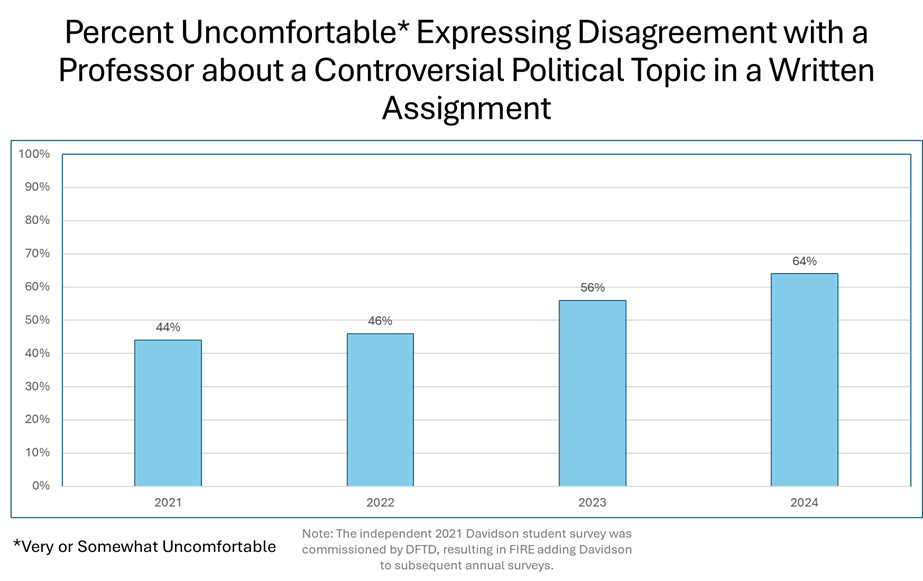
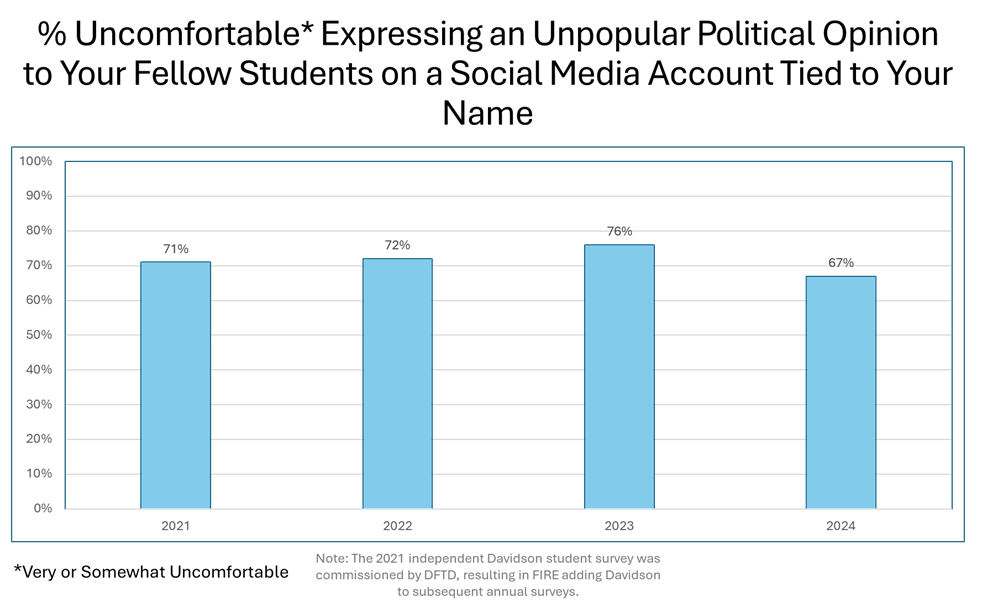
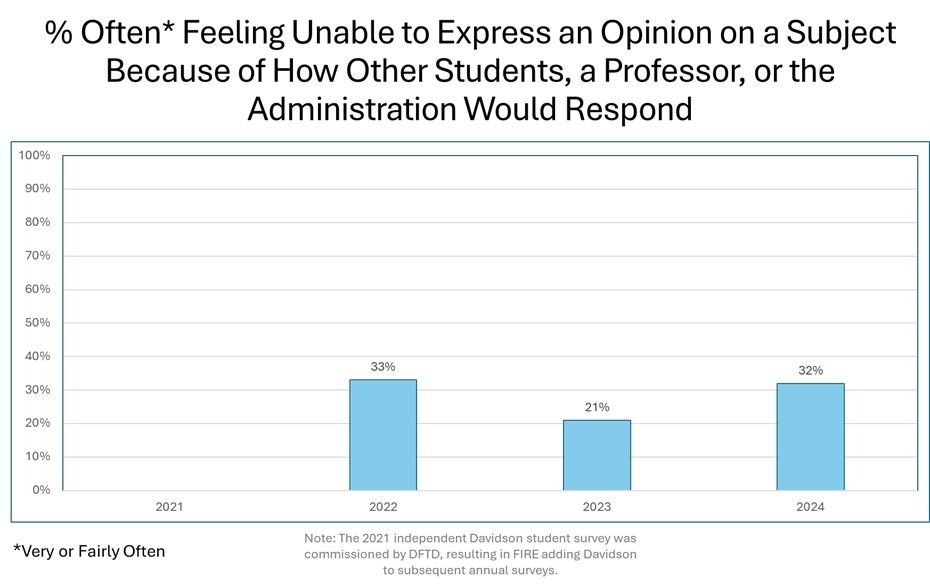
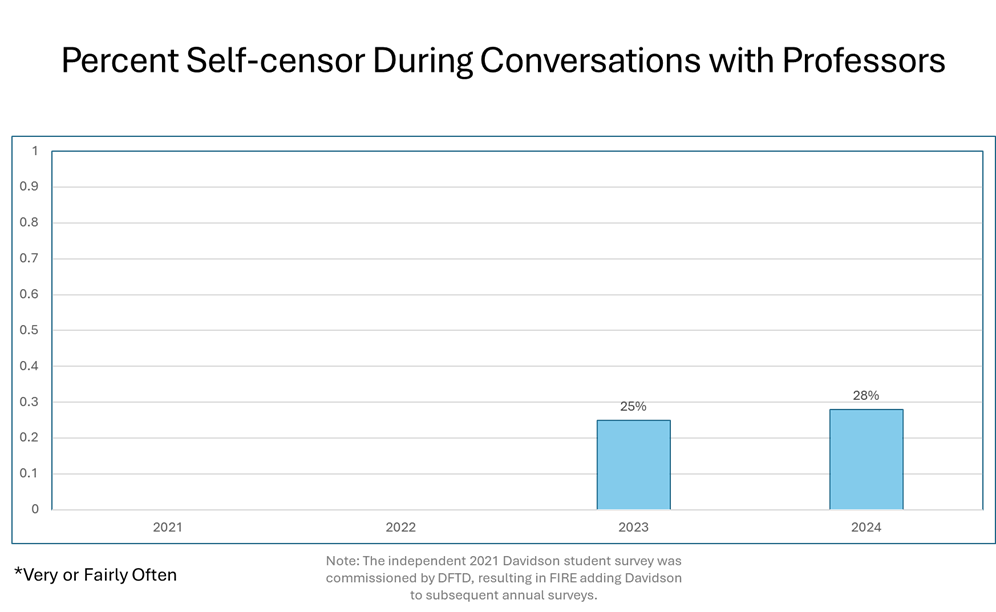


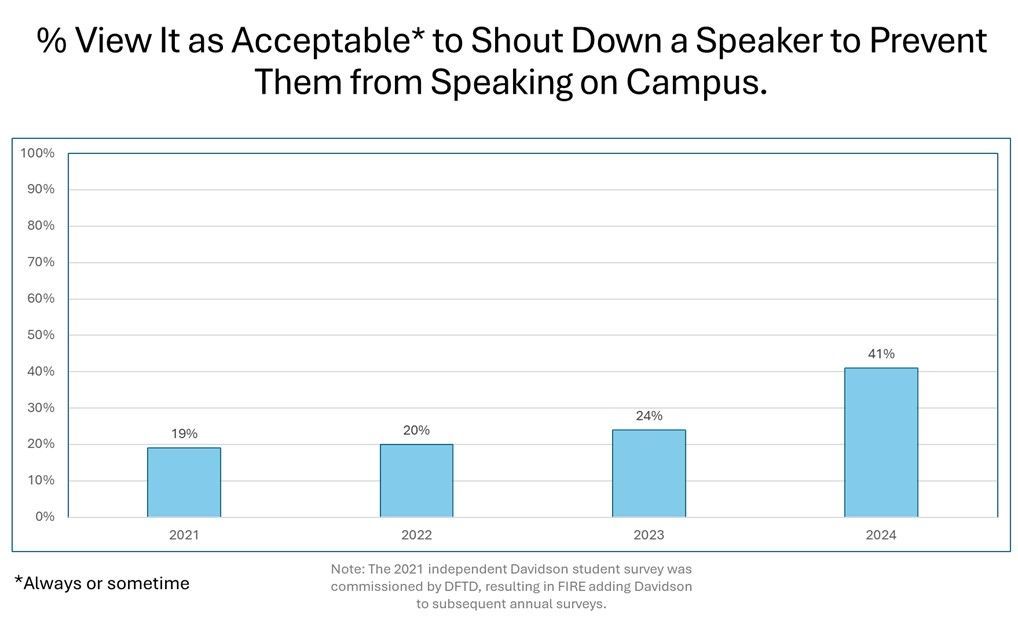
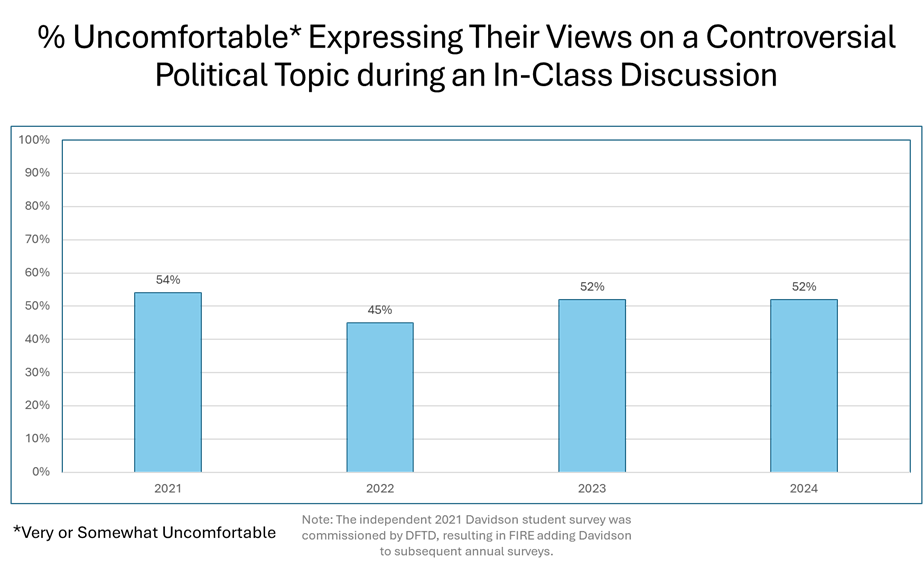
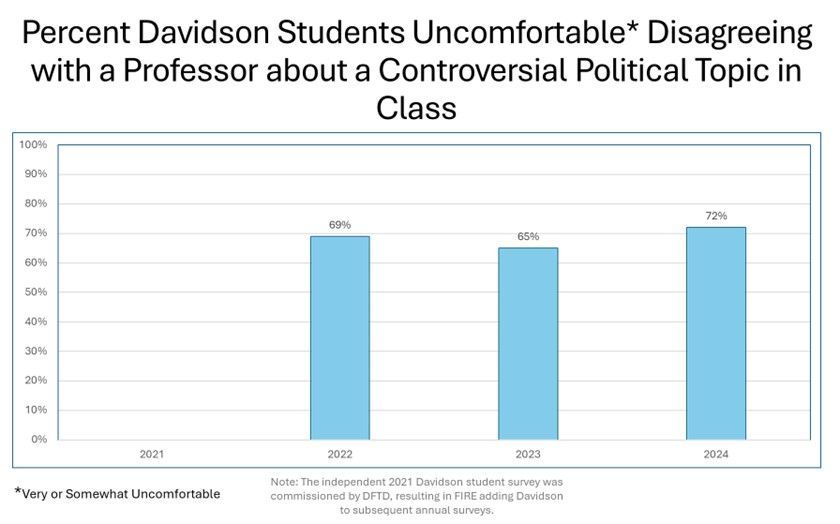
2023 FIRE Davidson Student Survey
The 2023 nation-wide annual surveys of university and college students on freedom of expression issues conducted by the Foundation for Individual Rights and Expression (FIRE) showed marginal improvement in Davidson College's national standings from a “slightly below average” #116 of 203 in 2022 to an “average” #64 of 248 in 2023.
Davidson’s speech code remained at a yellow light rating, meaning they have at least one speech code that restricts protected speech or by virtue of vague wording can be too easily used to restrict protected expression. Below is a comprehensive report of the Davidson College survey results.
FIRE Rankings of Davidson Relative to 248 Other Institutions in 2023 Survey
Overall Davidson Free Speech Rank: 64th out of 248
Comfort Expressing Ideas: 123rd (2022: 178th)
Disruptive Conduct: 56th (2022: 29th)
Openness: 159th (2022: 139th)
Administrative Support: 128th (2022: 180th)
Overall Tolerance for Speakers: 5th (2022: 14th)
Tolerance for Liberal Speakers: 18th (2022: 39th)
Tolerance for Conservative Speakers: 18th (2022: 43rd)
Speech Climate: Average (2022: Slightly Below Average)
Speech Code: Yellow (2022: Yellow)
*2023 Davidson Survey Findings Based on Survey of 144 Davidson Students
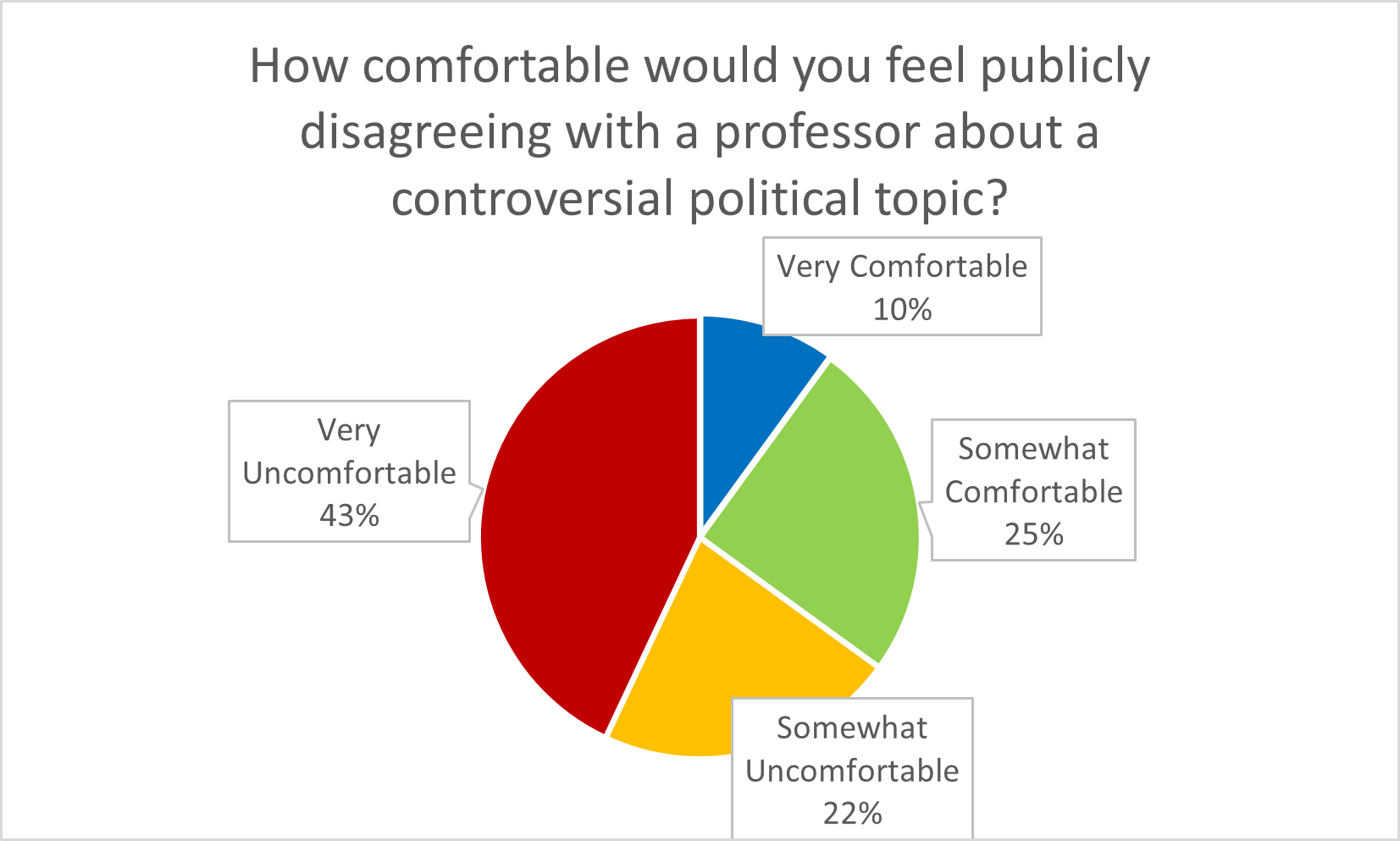
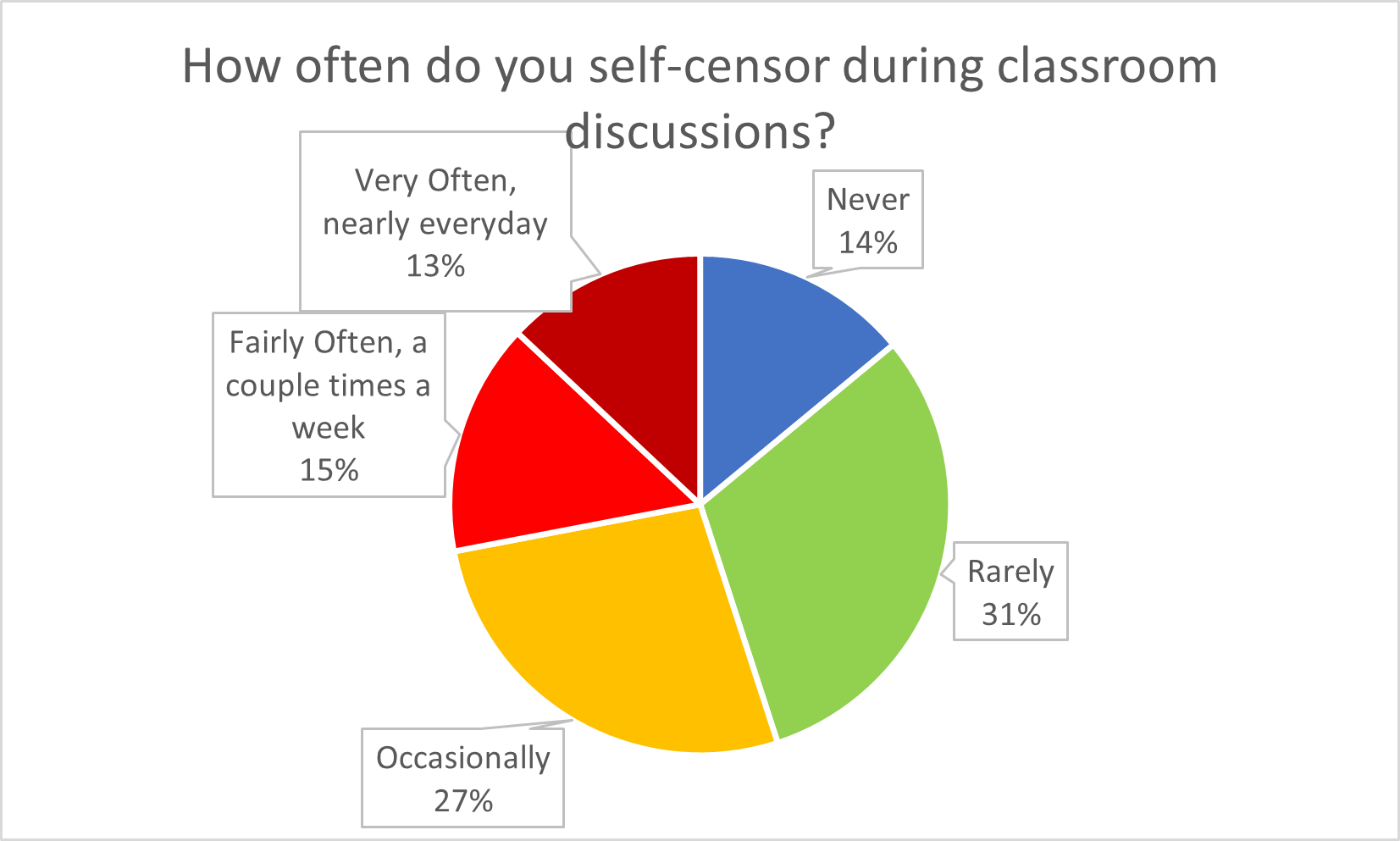
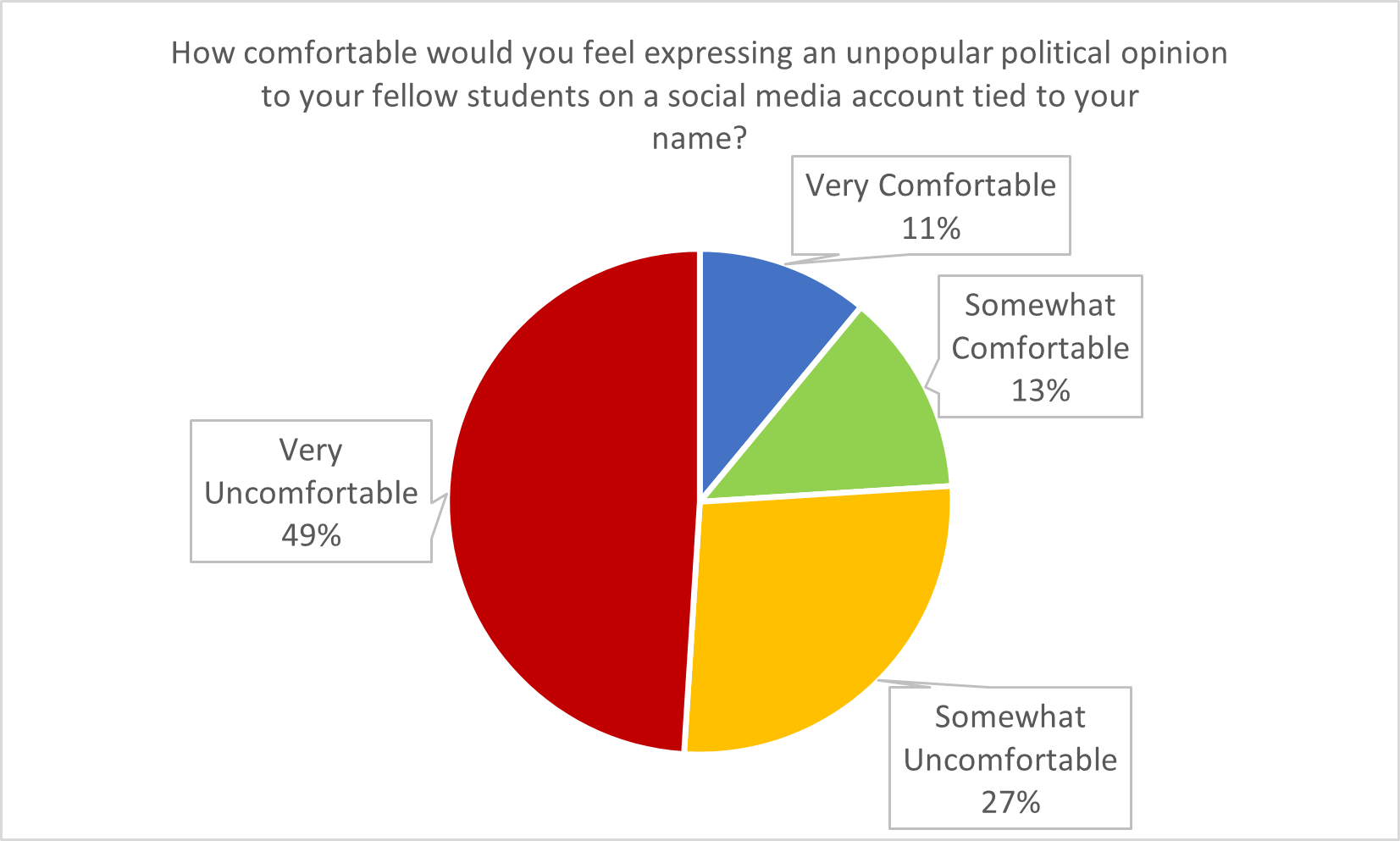
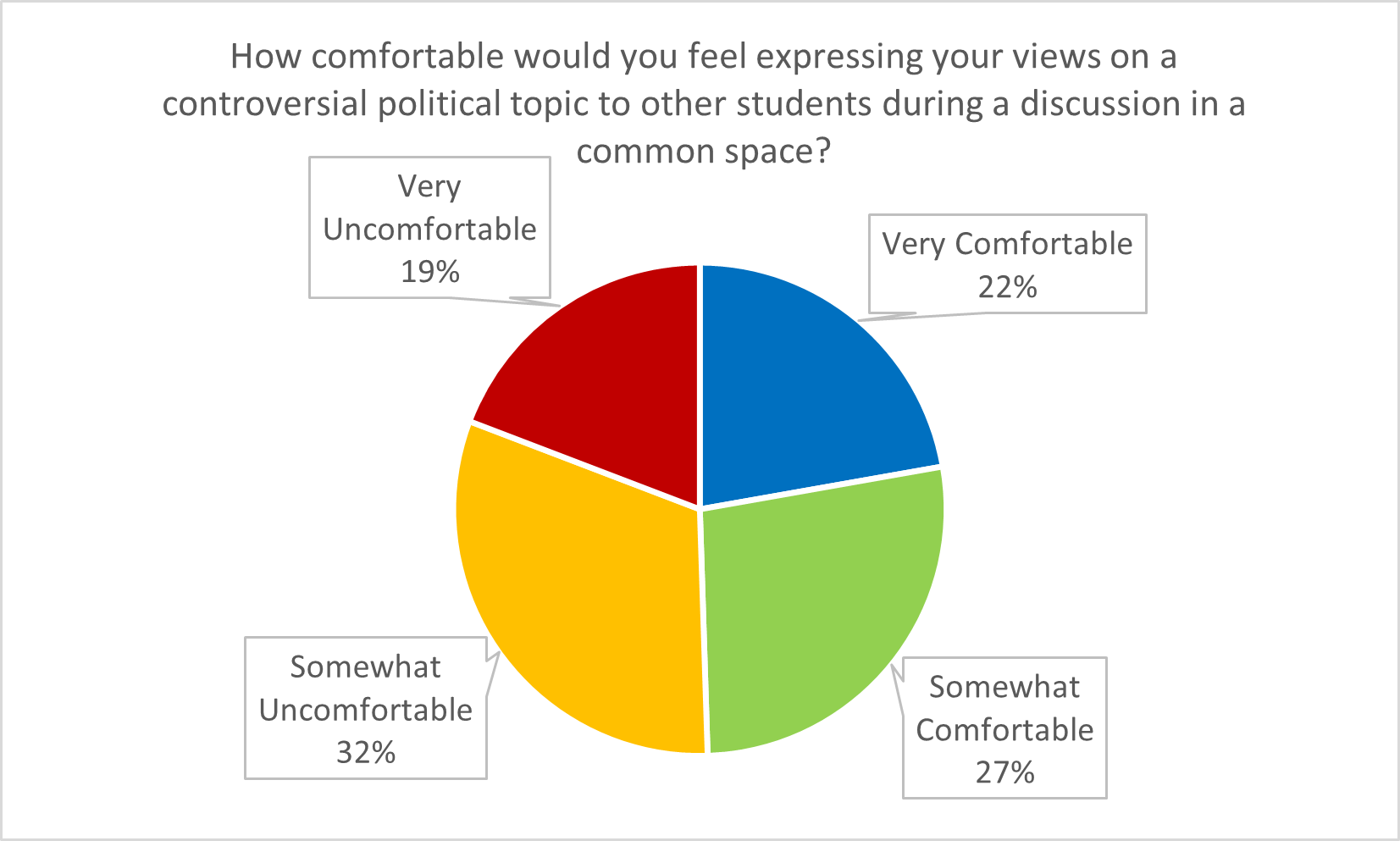
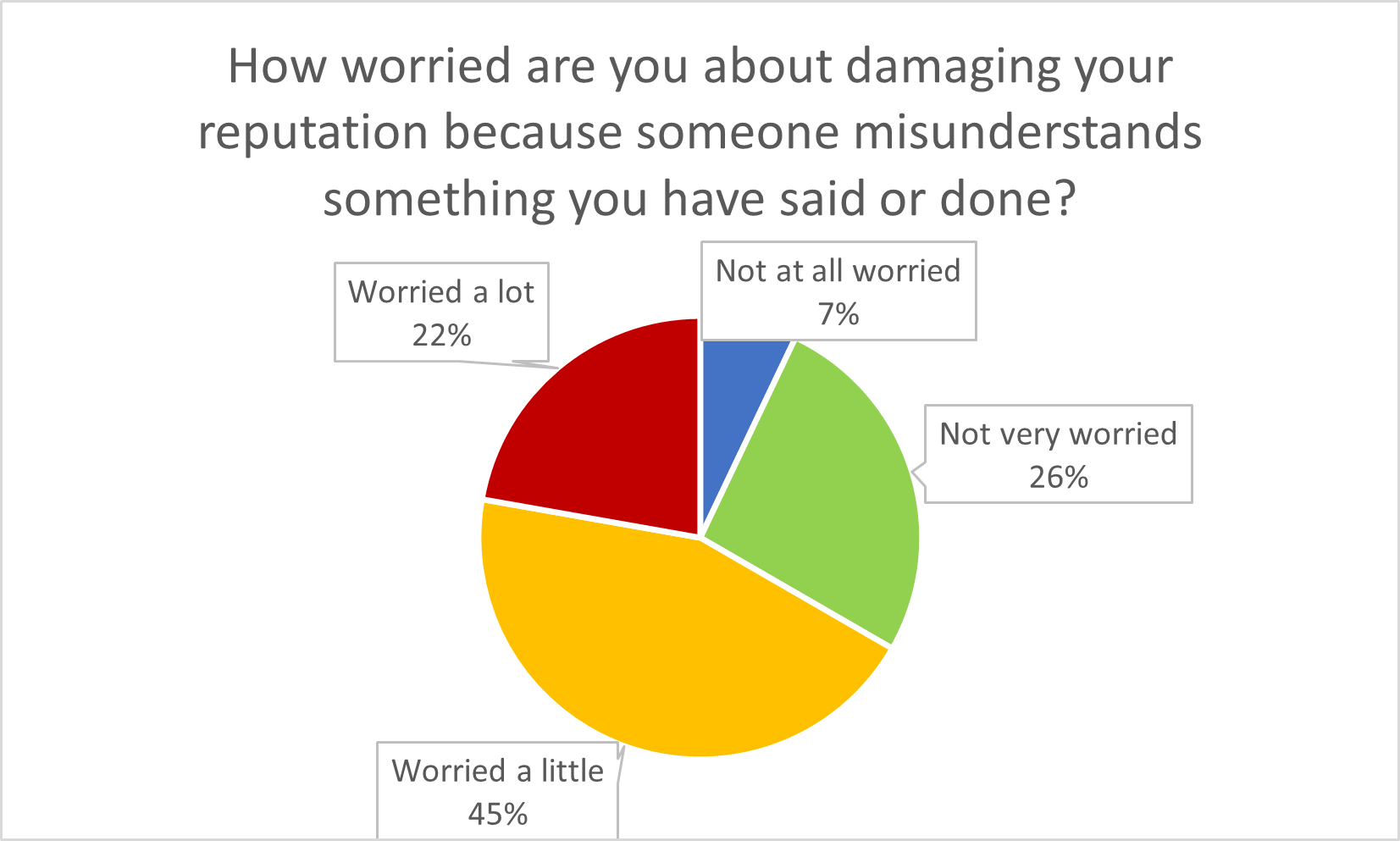
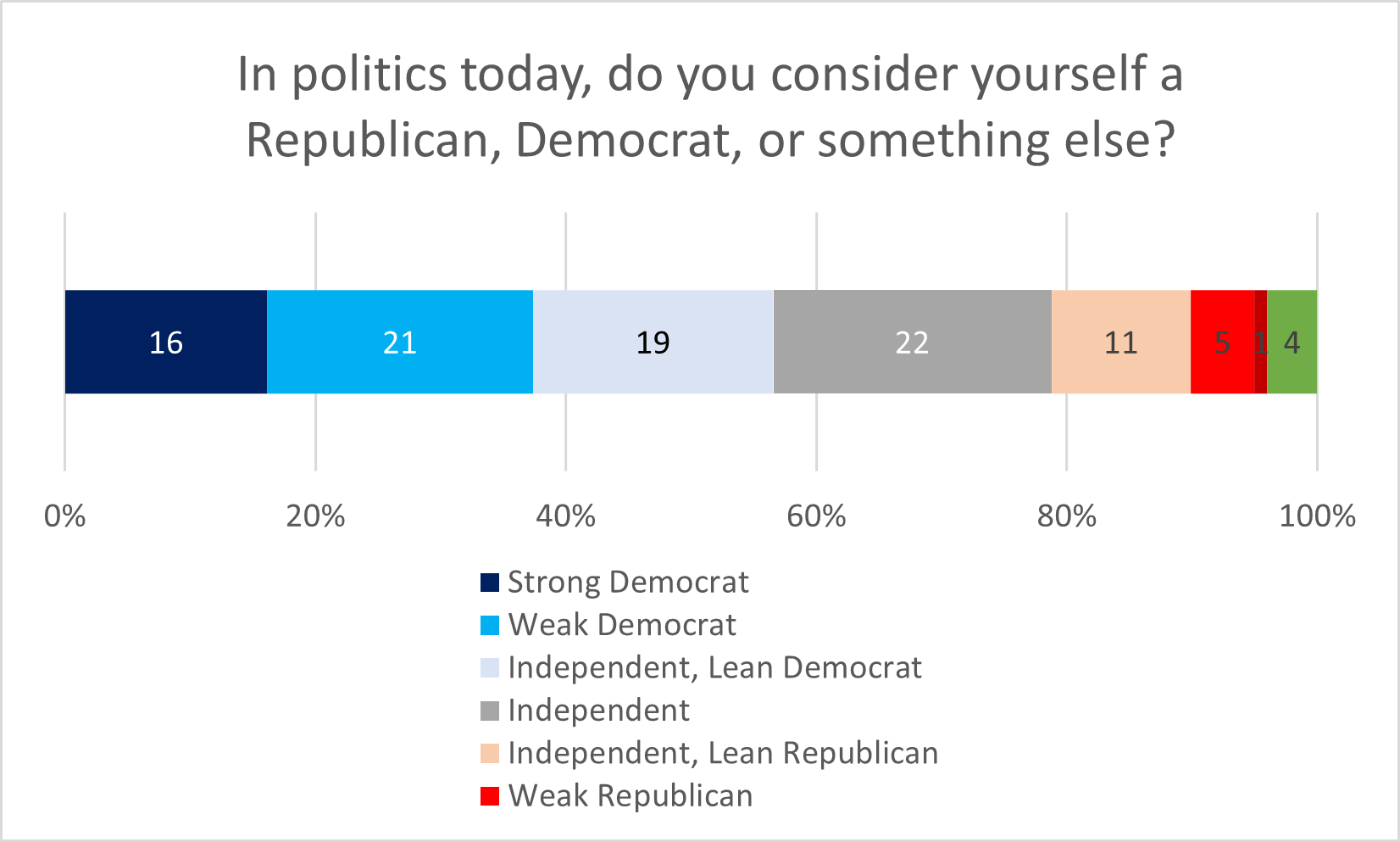
2022 FIRE Davidson Student Survey
For the first time in its nation-wide annual surveys of university and college students on freedom of expression issues, the Foundation for Individual Rights and Expression (FIRE) included Davidson College students in the 2022 cycle. The report that follows summarizes the views of Davidson students in 2022.
Davidson College ranked 116 of 203 in the 2022 College Free Speech Rankings. Additionally, Davidson’s speech code received a yellow light rating, meaning they have at least one speech code that restricts protected speech or by virtue of vague wording can be too easily used to restrict protected expression.
FIRE Rankings of Davidson Relative to 203 Other Institutions in 2022 Survey
Overall Davidson Free Speech Rank: 116 out of 203
Comfort Expressing Ideas: 178
Disruptive Conduct: 29
Openness: 139
Administrative Support: 180
Overall Tolerance for Speakers: 14
Tolerance for Liberal Speakers: 39
Tolerance for Conservative Speakers: 43
Speech Climate: Slightly Below Average
Speech Code: Yellow
2022 Davidson Survey Findings Based on Survey of 181 Davidson Students
Davidson Student Responses to "Please share a moment where you personally felt you could not express your opinion on your campus"
"When swarmed by a group all representing one ideological belief, I felt uncomfortable to share my opinion."--Class of 2025
"In class as the students here, not the professors, believe politics is life or death and they are never wrong. It is not about winning someone to your side but about a conversation, however that is not how it works here where students will blacklist you for even a moderate political view."--Class of 2024
"I'm not particularly one to get up and share my thoughts in a public setting, so I can't say I've wanted to say something and not said it out of fear. However, I certainly hold many beliefs that would be ridiculed if I expressed them on campus."--Class of 2024
"One of my professors is very politically and culturally sensitive, so we could never respond to his cultural comments objectively."--Class of 2024
"It seems like the student body and administration have a clearly unified opinion on the war in Ukraine, that happens to coincide with the opinions that are in the interests of U.S. empire. I think some large degree of how the narrative about what's happening is sold to us is largely propaganda, just like all the other conflicts that the U.S. government and media get involved in. I do not feel comfortable expressing my opinion on campus, except in private 1-on-1 conversations - anything outside the imperialist narrative wouldn't be publicly tolerated."– Class of 2024
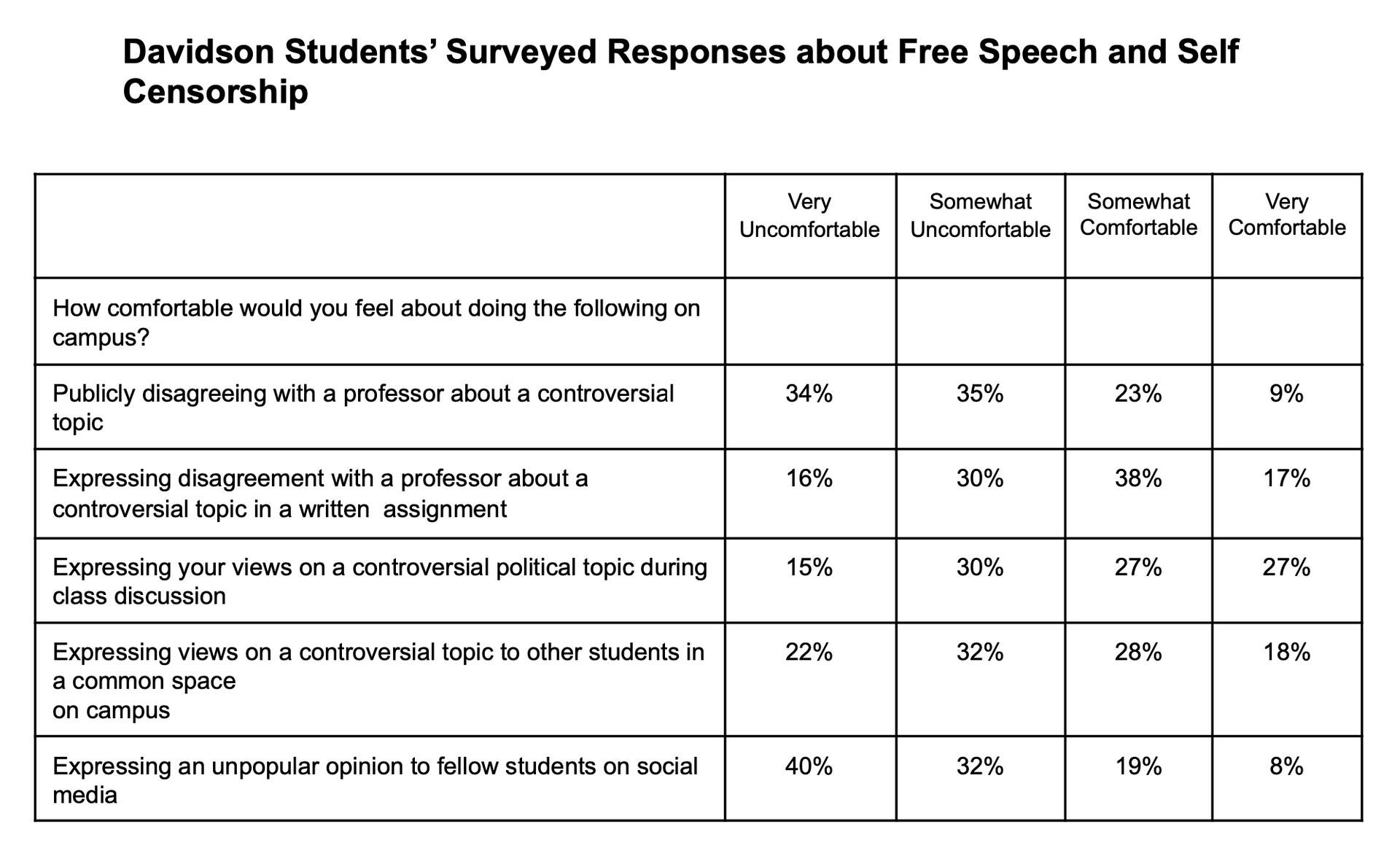
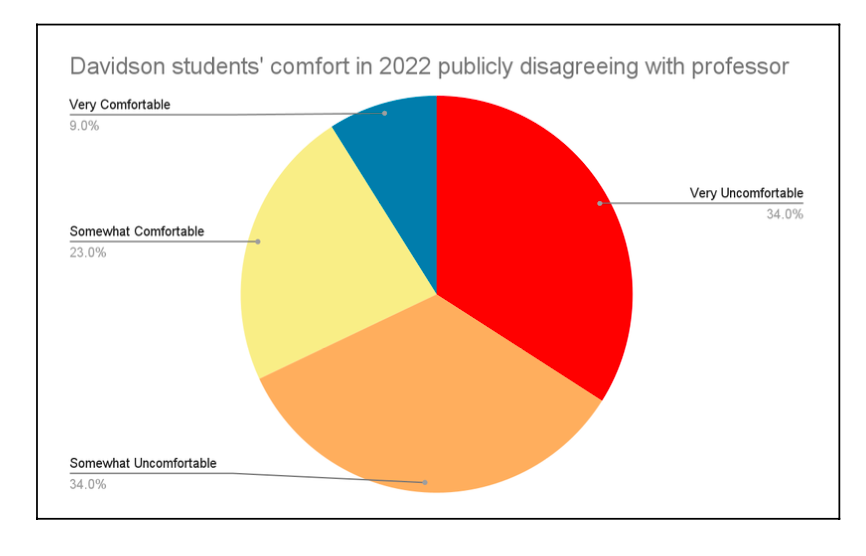
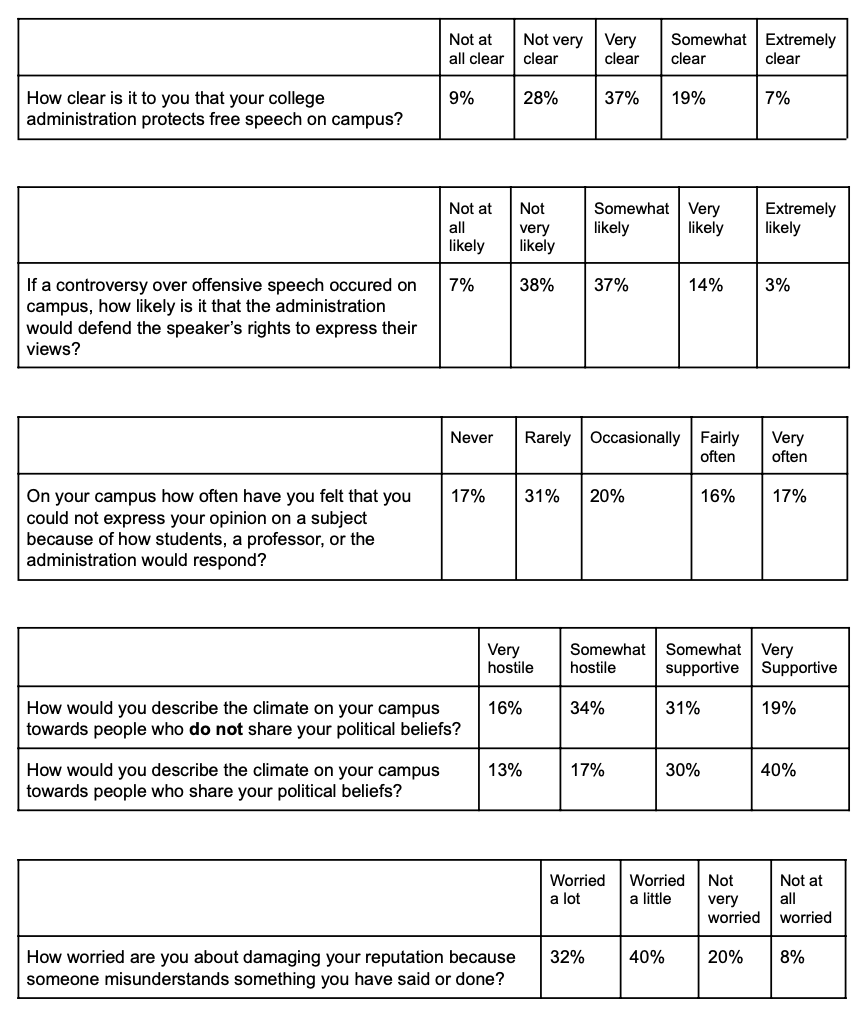
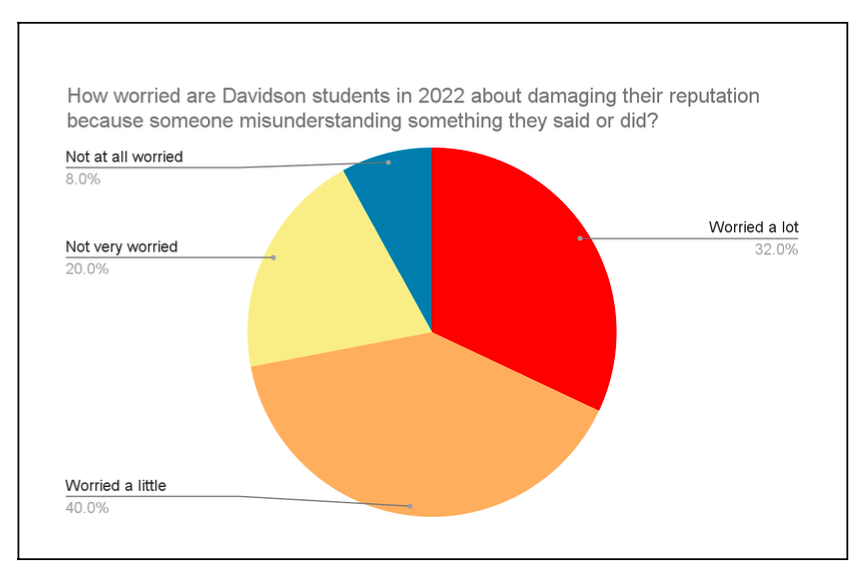

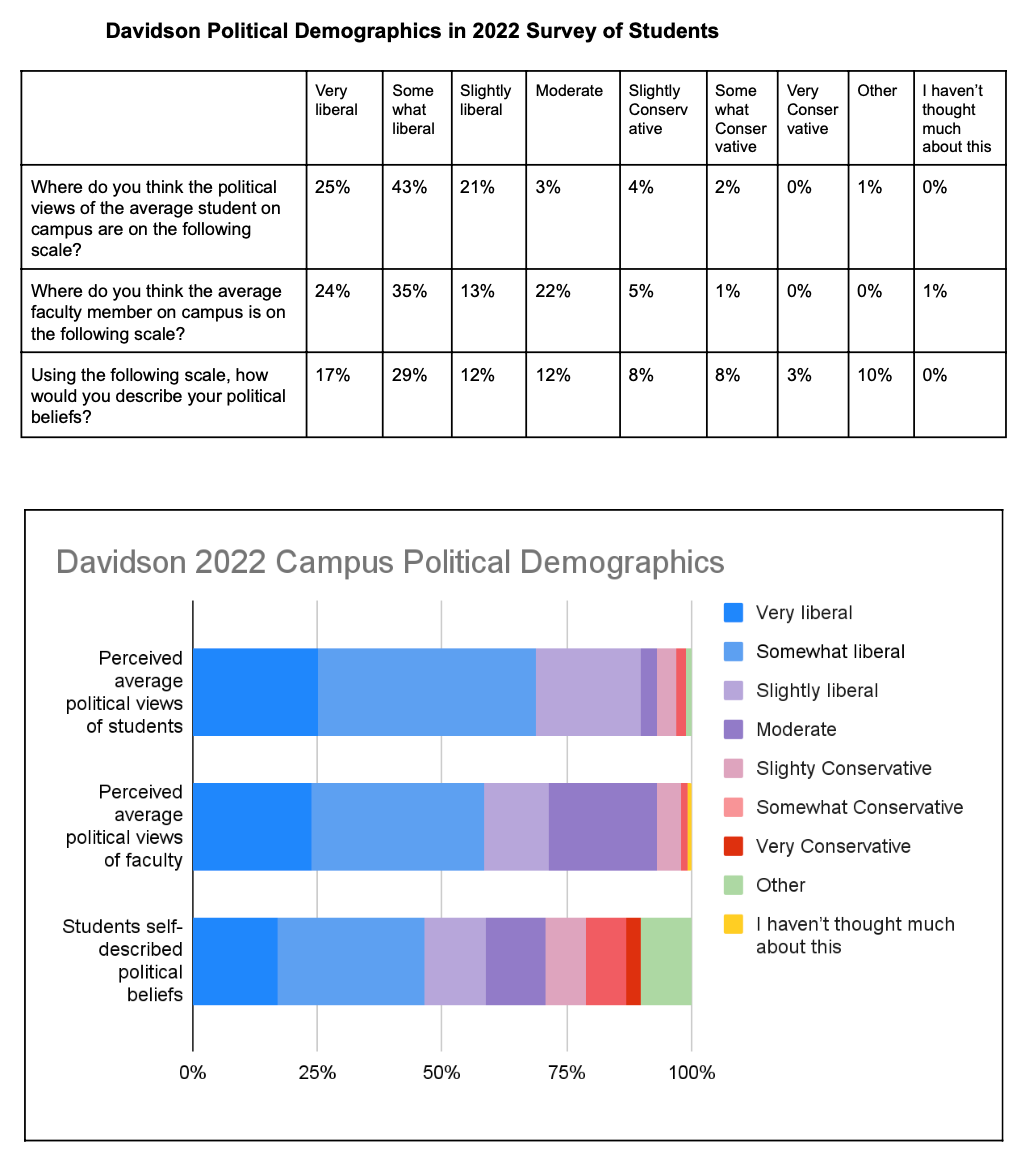
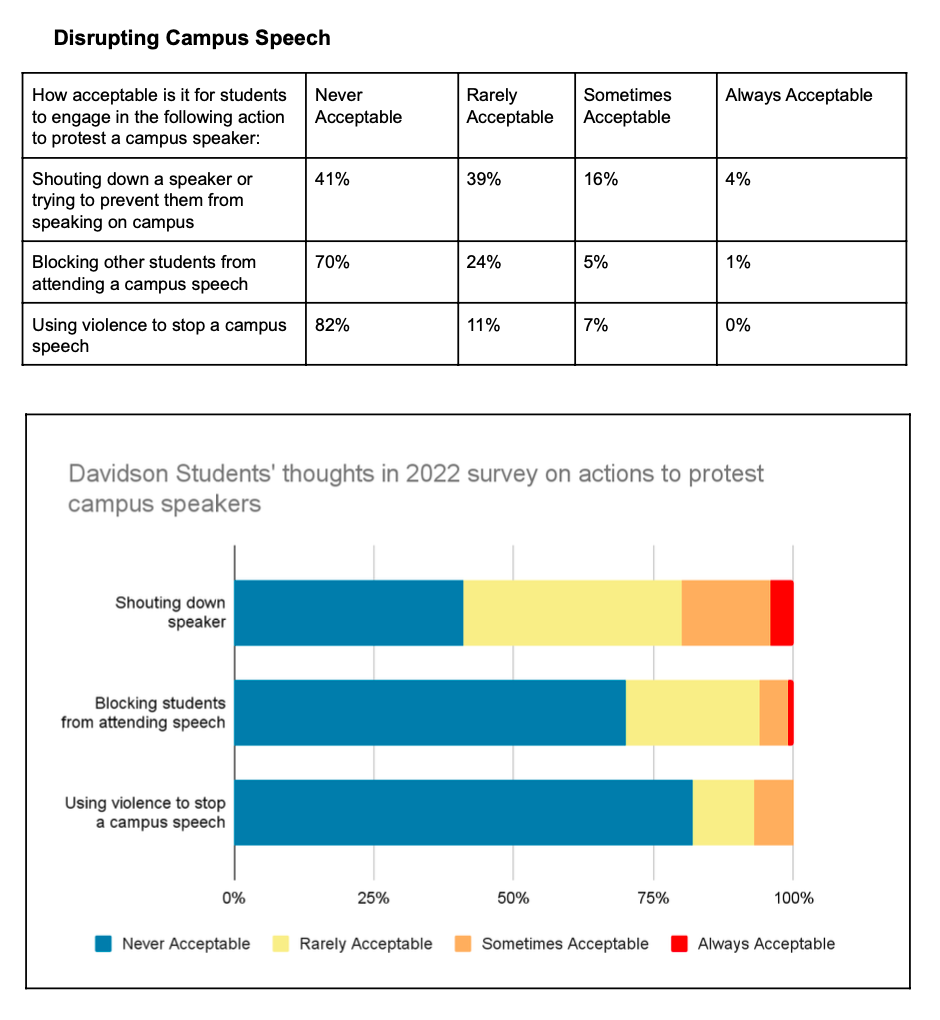
The 2022 Rankings
The College Free Speech Rankings are based on a composite score of ten sub-components. Six of these assessed student perceptions of different aspects of the speech climate on their campus. The other four assessed administrative behavior in regards to free expression on campus.
Student Perceptions
The student perception sub-components included:
- Comfort Expressing Ideas: Students were asked how comfortable they felt expressing their views on controversial topics in five different campus settings (e.g., in class or in the dining hall). Options ranged from “very uncomfortable” to “very comfortable.” They were also asked how often they felt they could not express their opinion because of how other students, faculty, or the administration would respond (options ranged from “never” to “very often”); if they were worried about damaging their reputation because of someone misunderstanding something they have said or done (options ranged from “worried a lot” to “not at all worried”); and if they felt pressure to avoid discussing controversial topics in their classes (options ranged from “no pressure at all” to “a great deal of pressure”). Responses were coded so that higher scores indicated greater comfort expressing ideas. The maximum number of points was 34.
- Tolerance for Liberal Speakers: Students were asked whether four speakers espousing views potentially offensive to conservatives (e.g., “Undocumented immigrants should be given the right to vote”) should be allowed on campus, regardless of whether they personally agreed with the speaker’s message. Options ranged from “definitely should not allow this speaker” to “definitely should allow this speaker” and were coded so that higher scores indicated more tolerance of the speaker (i.e., they should be allowed on campus). The maximum number of points was 16.
- Tolerance for Conservative Speakers: Students were also asked whether four speakers espousing views potentially offensive to liberals (e.g., “Black Lives Matter is a hate group”) should be allowed on campus, regardless of whether they personally agreed with the speaker’s message. Scoring was performed in the same manner as the Tolerance for Liberal Speakers sub-component, and the maximum number of points was 16.
- Disruptive Conduct: Students were asked how acceptable or unacceptable it is to engage in different methods of protest against a campus speaker. These included “Shouting down a speaker or trying to prevent them from speaking on campus,” “Blocking other students from attending a campus speech,” and “Using violence to stop a campus speech.” Options ranged from “always acceptable” to “never acceptable” and were coded so that higher scores indicated less acceptance of disruptive conduct. The maximum number of points was 12.
- Administrative Support: Students were asked how clear their campus administration’s stance on free speech was and how likely the administration would be to defend a speaker's right to express their views if a controversy over speech occurred on campus. For the administrative stance question, options ranged from “not at all clear” to “extremely clear”; for the administrative controversy question, options ranged from “not at all likely” to “extremely likely.” Options were coded so that higher scores indicated greater clarity and greater likelihood of defending a speaker’s rights. The maximum number of points was 10.
- Openness: Finally, students were asked which of 17 issues (e.g., abortion, freedom of speech, gun control, or racial inequality) were difficult to have open conversations about on campus. Students also could select an option stating that none of these issues was difficult to discuss. Responses were coded so that higher scores indicated fewer issues being selected. The maximum number of points was 17.
Two additional constructs, Mean Tolerance and Tolerance Difference, were computed from the Tolerance for Liberal/Conservative Speaker sub-components. Tolerance Difference was calculated by subtracting Tolerance for Conservative Speakers from Tolerance for Liberal Speakers and then taking the absolute value (so that a bias on either side would be treated the same).
Administrative Behavior
The administrative behavior sub-components included:
- Supported Scholars 2019 to 2022: The number of scholars whose speech rights were supported by the administration at a school during a free expression controversy over a four-year time period as recorded by FIRE’s Scholar’s Under Fire Database.1 This support was unequivocal; if an administration condemned the speech, apologized for the scholar’s expression, or sanctioned the scholar, despite issuing a statement of support, it was not included in a school’s total.
- Sanctioned Scholars 2019 to 2022: The number of scholars sanctioned (e.g., placed under investigation, suspended, or terminated) at a school over a four-year period, as recorded in FIRE’s Scholars Under Fire Database.
- Successful Disinvitations 2019 to 2022: The number of successful disinvitations that occurred at a school over a four-year time period as recorded by FIRE’s Campus Disinvitation Database.2
- FIRE Speech Code Rating: FIRE rates the written policies governing student speech at more than 475 institutions of higher education in the United States. Three substantive ratings are possible: Red, Yellow, or Green (actually “red light,” “yellow light,” and “green light”). A rating of Red indicates that the institution has at least one policy that both clearly and substantially restricts freedom of speech. Colleges with Yellow ratings have policies that restrict a more limited amount of protected expression or, by virtue of their vague wording, could too easily be used to restrict protected expression. The policies of an institution with a Green rating do not seriously threaten speech, although this rating does not indicate whether a college actively supports free expression. Finally, a fourth rating, Warning, is assigned to a private college or university when its policies clearly and consistently state that it prioritizes other values over a commitment to freedom of speech. Warning schools therefore were not ranked, and their overall scores are presented separately in this report.3
1 The Scholars Under Fire Database is on FIRE’s website at https://www.thefire.org/research/publications/miscellaneous-publications/scholars-under-fire/. For 2022, the cutoff date for inclusion was July 1, 2022.
2 The Campus Disinvitation database is on FIRE’s website at https://www.thefire.org/research/disinvitation-database/. For 2022, the cutoff date was July 1, 2022.
3 The Spotlight Database is on FIRE’s website at https://www.thefire.org/resources/spotlight/.

2021 ACTA Student Survey at Davidson College
Freedom of Expression at Davidson College:
Is there a Problem?
I first noticed cancel culture at Davidson as a new student last year. Of course, there was a high volume of emotional intensity that accompanied the 2020 presidential election, but I couldn’t help but feel a sense of unease around the comments I overheard from my peers. Anyone who raised questions about the “correct” belief to have was immediately silenced by backlash from their peers or fear of social exclusion. Though the circumstances are different now, this dynamic is still overwhelmingly present on campus.
. . . it makes me sad to see my peers ostracized just for voicing new ideas, especially when the sense of community at Davidson is a compelling factor that draws new students to campus every year.
—Samantha Ewing, Class of 2023
Samantha Ewing, current vice president of the Davidson Student Government Association, articulated concerns about freedom of expression and open, civil discourse on the Davidson campus in her November 10, 2021, perspectives column for the student newspaper, The Davidsonian. Her column echoes student complaints at colleges around the country; and they appear to contradict assurances from Davidson College administrators that norms of freedom of expression are strong on campus. Observations such as Ms. Ewing’s, that students fear expressing social and political viewpoints that differ from mainstream campus beliefs, should signal to college leaders that there may be a problem. When they are supported (or contradicted) by empirical data from multiple sources, campus leaders have the information they need to act and, on campuses where large numbers of students report a climate that discourages open debate, a responsibility to do so.
The alumni group Davidsonians for Freedom of Thought and Discourse (DFTD) was founded in 2018 to monitor the state of free expression, diversity of viewpoints, and ideological balance at Davidson College. Free and open debate is the lifeblood of any university because it is the precondition of the pursuit of truth. As University of Chicago President Robert M. Hutchins put it almost a century ago, “free inquiry is indispensable to the good life . . . [U]niversities exist for the sake of such inquiry, [and] without it they cease to be universities.”2 Viewpoint diversity is also essential to a truly liberal education because it is only by testing one’s own beliefs against radical alternatives that students refine their own viewpoints, learn the skill of critical analysis, and develop individuality and authentic character.
DFTD was also founded to undertake research to help clarify whether perceived problems in these key areas are real. A Fall 2021 survey of major donors to Davidson College,3 virtually all of whom are alumni, revealed an urgent problem: Only 20% answered that it is “extremely” or “very clear” to them that the college administration protects free speech on campus, and 94% said that Davidson’s next president should make campus freedom of speech and open, civil discourse a priority.
But do Davidson’s major donors have it right? Is there in reality a problem that needs to be addressed?
To help answer this question, DFTD commissioned College Pulse—an online survey and analytics company dedicated to understanding the attitudes, preferences, and behaviors of today’s college students—to conduct an independent, anonymous survey of Davidson students. The 38-question survey was designed to investigate attitudes on a wide range of issues concerning freedom of speech and ideological balance; 148 Davidson College students completed it between September 15 and November 20, 2021. To help ensure diversity in the panel population, panel members were recruited by a number of methods, including web advertising, permission-based email campaigns, and partnerships with higher education organizations.
College Pulse has established expertise specifically in this research area. The firm conducts student surveys that are the basis for the Foundation for Individual Rights in Education’s (FIRE) annual College Free Speech Rankings4 and has recently completed a survey for the American Council of Trustees and Alumni (ACTA) specifically focused on freedom of expression at liberal arts colleges. Davidson students were not included in FIRE’s Spring 2021 surveys of more than 37,000 undergraduates at 159 colleges and universities or in ACTA’s smaller, targeted survey of liberal arts colleges, but this independent Fall 2021 survey of Davidson College students is close enough to the date of the other surveys to make reliable comparisons of findings where the survey questions were identical.
With so much national and campus attention focused on the problem of student self-censorship, Davidson College administrators recently convened a committee to compose a statement expressing the campus’s commitment to academic freedom. The resulting document, “Davidson’s Commitment to Freedom of Expression,” released in draft form on November 29, 2021, is an important first step toward restoring norms of free inquiry. But statements of principle must be accompanied by action in order to bring about the cultural change necessary to build a truly free and open marketplace of ideas. To achieve this, nothing is more important than presidential leadership. As Davidson College undertakes a search for its 17th president, the search committee has an opportunity to choose a leader who has demonstrated a principled commitment to free speech and viewpoint diversity.
The following summary of the Fall 2021 Davidson student survey findings presents the first available empirical data on the extent to which obstacles to freedom of expression are real and pervasive at Davidson. The findings also include insights from students on what they believe the priorities for Davidson’s next president should be. ACTA commends this report to the close attention of Davidson’s Board of Trustees and of the Presidential Search Committee that is now working to identify Davidson’s next president.
